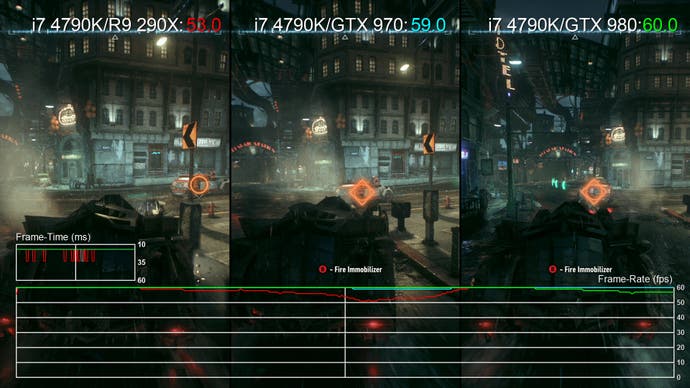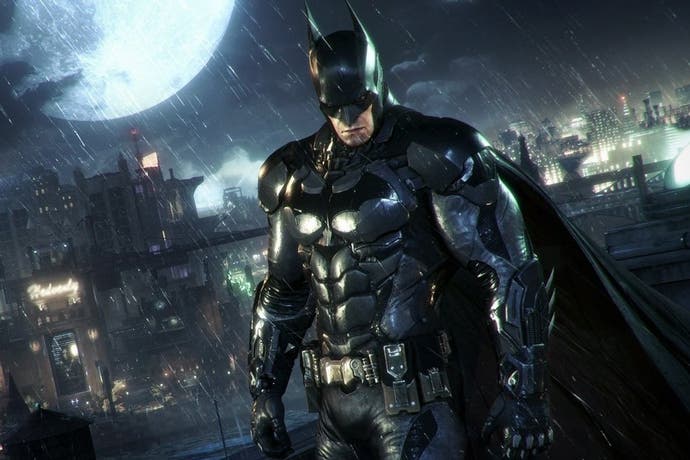Performance Analysis: Batman on PC is still a disappointment
Arkham Knight is back on sale - but it's still nowhere near good enough.
It's been four months from the initial release of the nightmarish PC version of Batman: Arkham Knight - an outsourced port so bad that the publisher felt it had no choice but to remove the game from sale. An interim patch was pushed out for existing owners last month, but a new 2.3GB update was unveiled on Wednesday, alongside a re-release of the game. Yes, Batman Arkham Knight is available for sale once more but the question is, are the major issues surrounding the title resolved? Is it actually worthy of purchase?
Looking at the latest patch notes, it's safe to say that we went into our testing with little optimism. Warner Bros' focus is seemingly on bringing the PC version of the game up to date with the console releases in terms of DLC content. While the September interim patch listed some technical enhancements - plus the addition of a high quality texture option - there was nothing in the latest update to suggest any further enhancements to the technological nuts and bolts of the game - and that's a fundamental problem.
Looking back at our initial report on the PC version, we saw a woefully optimised release, lacking visual features found in the console versions of the game. Arkham Knight was also unable to sustain 60fps, even with the artificial frame-rate cap unlocked, and with a Core i7 and a powerful GTX 780 Ti powering the game. A week later, the visual issues were mostly resolved, and we posted our recommended settings - effectively using the Nvidia control panel to force a properly frame-paced 30fps, even though our GTX 960 and GTX 970 were left brutally under-utilised as a result.
Revisiting the game now, there are improvements compared to the launch code, but it's safe to say that the changes do not go far enough. Indeed, based on our tests, it seems that the level of optimisation has not moved on much at all from last month's interim patch. That's not to say that there aren't any improvements at all - in an all-out assault on a 2GB graphics card's VRAM, paging too and from memory does seem to have got better. However, this barely makes a dent on general in-game performance. In terms of hitting 1080p at 60fps, again, there's improvement compared to the launch code, but even now, pairing an overclocked Core i7 4790K with either an R9 290X or a GTX 970 isn't enough to stop occasional glitching - even with the Nvidia GameWorks effects turned off. Even moving up to a GTX 980 still sees noticeable stutter beneath 60fps. It's not game-breaking, but it's certainly annoying and intrusive. The problem is that below this formidable threshold, we still face exactly the same problems that limited our choices way back in June.
To enjoy Arkham City at high settings with normal quality textures (which is broadly on par with the console versions) and without some brutal stutter, you're going to need a graphics card with at least 3GB of VRAM, and 4GB if you want to push texture detail to high. Plug in a 2GB card - we tested an R9 285 and a GTX 960 - and the stutter is unavoidable. Developer Iron Galaxy hasn't really optimised the game for mainstream graphics cards at all - instead there's a VRAM indicator in the settings that tells you when you are going to experience sub-par performance. On a 2GB card, only by dropping texture quality to the lowest setting do you get developer approval for a smooth gameplay experience - an absolutely remarkable state of affairs and simply not good enough. Making matters worse is that using the 2GB R9 285, even with low textures, we still managed to get some noticeable stutter. It's a bit of a mess and it needn't have been like this. Many PC developers spend a lot of time behind the scenes devising background streaming to and from VRAM in order to offer visual parity with consoles for those with 2GB PC graphics cards. Arkham Knight effectively gives you two choices - to nerf the game's visuals, or else go out and buy a new GPU.
Is there any kind of alternative? Well, for Nvidia owners with 2GB cards, the advice we gave back in July holds firm here - your best bet for a reasonably consistent experience is to invoke half-rate adaptive v-sync from the Nvidia GPU control panel. This limits performance to 30fps, and allows for screen-tear when the engine dips beneath. Drop textures to normal and for the most part, you'll be OK - though you will still encounter stutter in the fastest Batmobile scenes. Dropping shadow quality to normal can help, but this still doesn't completely eliminate the issue. AMD owners will have to make do with the game's own 30fps limiter - which unfortunately still has no regard for frame-pacing, producing an off-putting judder when v-sync is enabled. On the plus side, AMD's R9 380 and the R9 285 were a complete write-off with Arkham Knight back at launch. These cards now see much improved performance, but 2GB AMD hardware clearly and noticeably stutters more heavily than Nvidia equivalents on console-level settings.
Ultimately, what's most disappointing about the PC version of Arkham Knight is that there's little sense that the scalability of the game has improved much since launch. For those with entry-level and mid-range enthusiast gaming PCs, the developer's inability to produce a solution for optimising streaming for 2GB GPUs is simply not good enough. Effectively, locking to 30fps is the only way forward as it helps to mitigates the stutter, but it means that for cards like the GTX 960, plenty of GPU horsepower is left untapped. The only route forward there really is to run at 1440p or super-sample that resolution downwards to 1080p. Even those at the absolute top-end will be left underwhelmed - the GTX 980 Ti exhibits exactly the same sub-60fps stutter as the GTX 970 and GTX 980. To be clear, it's not game-breaking and it is preferable to a locked 30fps across the run of play, but the fact that we are seeing it all with high-level parts demonstrates that there's no way to power past all of this game's issues.

Fundamental issues remain unresolved then. Warner Bros has warned us to expect performance problems with certain graphics cards running on the latest drivers (but doesn't tell us which), SLI and CrossFire still hasn't been implemented in four months, and the almost throwaway note that Windows 10 users will require 12GB of RAM (!) to run the game without paging issues (stutter, in other words) is remarkable. All the contrition from developer and publisher a few months back means nothing if there is no end product that puts the situation right.
In conclusion, this is a wholly sub-optimal release that remains one of the most disappointing PC versions we've played - improvements have been made since launch, but we can't help but wonder just how much work has gone into getting this game into shape - especially in the last month since the interim patch was deployed. At least it is possible to get the kind of experience Rocksteady original envisaged, but the hardware requirement to do so - specifically a graphics card laden with VRAM - means that only an absolutely minuscule minority of the PC userbase are invited to the party. 1080p60 gameplay is now possible too, but you're looking at a £250 graphics card to get the job done, and even then you'll still have memory page swapping issues. In an effort to eliminate this from our system, we paired the i7 4790K and GTX 980 with 2400MHz DDR3, but the faster RAM in this instance still could not prevent stutter during speedy Batmobile gameplay.
A couple of weeks ago, we reviewed the 4GB version of Nvidia's GTX 960 and came to the conclusion that 4GB of VRAM does make a difference - but only in a handful of titles. We suggested that four gigs is more of an insurance policy of sorts against badly optimised console ports. We omitted testing Batman: Arkham Knight at the time because the game was withdrawn from sale, and the publisher deserved the benefit of the doubt. We hoped that the re-release of the game would present marked, tangible improvement. Unfortunately, that hasn't happened. Assuming your PC is robust enough and you have enough VRAM, you can buy this game and get a decent enough console-level experience - but bearing in mind the continued lack of respect for the PC userbase, the question is whether the developers and publishers deserve your support at all.









